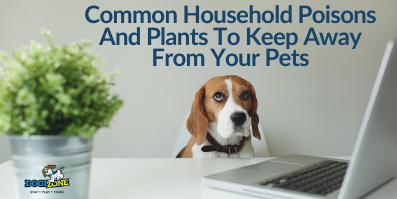Common Household Poisons And Plants To Keep Away From Your Pets
It is not uncommon for typical household poisons, including some foods we enjoy as humans, to be common items for our pets. While most people understand the risk of chemicals and cleaning compounds for dogs, they may not realize that there are other household poisons lurking in the home, and these products and plants may be within easy reach of your pet.

To help in protecting your dog, keeping the following items in secure cupboards or on top shelves out of the reach of your dog is the best option. While puppies and young dogs are more likely to chew and eat items in the home or in the yard, older dogs can also engage in these behaviors, so making it a habit to keep poisons out of the reach of your pet is always the safest solution.
Medications
Any type of over-the-counter or prescription medications can be deadly for dogs. Keep pills, cough syrup, tablets, or any type of formulation of medications, herbal supplements, or other types of similar products in cabinets or cupboards well out of reach of your dog is always the safest option. Never give your dog human medications unless you first consult with your vet.
Keep in mind, prescriptions or over-the-counter supplements or products for your pets are also a danger if they are not consumed using the correct dosage. These items also need to be kept in a secure location.
Chocolate and Other Human Foods
Most dog owners are aware that chocolate is a toxin for dogs, with dark chocolate the most deadly. However, avoiding all chocolate for your dog is the safest option. Other human foods that are problematic include grapes, raisins, onions, garlic, any foods or beverages containing caffeine, macadamia nuts, and any types of foods that include Xylitol, which is found in many sugar-free types of products.
Chemicals
Dogs can and do consume almost anything, and products such as glues and adhesives, paints, cleaning solutions and chemicals, pesticides, or any type of rodent or insect bait products are a risk for your pet.
Natural fertilizers, as well as the commercial fertilizers used in the spring and summer, are also tasty to many dogs, resulting in toxic reactions even with just a small amount.
Plants
Many very common decorative plants kept indoors as well as outdoors are a risk for dogs and other pets. It is a good idea to check any plant before bringing it into the house or adding it to your landscaping.
Common plants that are toxic to dogs include English ivy, oleander, castor bean plants, cyclamen, dieffenbachia, bleeding heart, pothos, chrysanthemum, azalea, schefflera, and rhododendron plants. Treat all types of flower bulbs as toxic as well.
If you believe your dog has ingested something toxic, immediately contact your vet or the ASPCA poison control line at 888-426-4435.

